

+Cellular Energy. +Light. +Pregnenolone & Progesterone.
New Cochrane health evidence challenges belief that omega 3 supplements reduce risk of heart disease, stroke or death. New evidence published today shows there is little or no effect of omega 3 supplements on our risk of experiencing heart disease, stroke or death.
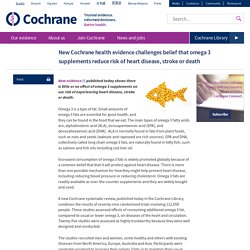
Omega 3 is a type of fat. Small amounts of omega 3 fats are essential for good health, and they can be found in the food that we eat. The main types of omega 3 fatty acids are; alphalinolenic acid (ALA), eicosapentaenoic acid (EPA), and docosahexaenoic acid (DHA). ALA is normally found in fats from plant foods, such as nuts and seeds (walnuts and rapeseed are rich sources). -CO1. -Liquid Oils. -PUFA. FFA, Free Fatty Acids interfere directly with mitochondria function, Note 773. -Prostaglandins. -Soy Oil. Oil comparison chart. Unsaturated fatty acids: Nutritionally essential, or toxic? Unsaturated fatty acids: Nutritionally essential, or toxic?
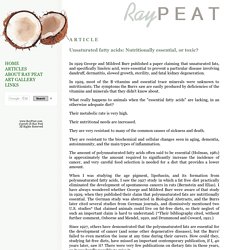
In 1929 George and Mildred Burr published a paper claiming that unsaturated fats, and specifically linoleic acid, were essential to prevent a particular disease involving dandruff, dermatitis, slowed growth, sterility, and fatal kidney degeneration. In 1929, most of the B vitamins and essential trace minerals were unknown to nutritionists. The symptoms the Burrs saw are easily produced by deficiencies of the vitamins and minerals that they didn't know about. What really happens to animals when the "essential fatty acids" are lacking, in an otherwise adequate diet?
Their metabolic rate is very high. Their nutritional needs are increased. They are very resistant to many of the common causes of sickness and death. They are resistant to the biochemical and cellular changes seen in aging, dementia, autoimmunity, and the main types of inflammation. Pearl did an experiment, sprouting cantaloupe seeds in a dish with water. V. Dev. Zeitschr. Unsaturated Vegetable Oils: Toxic. Unsaturated Vegetable Oils: Toxic Immunodeficiency (weakness of the immune system) can take many forms.
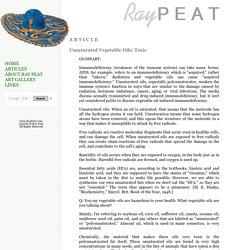
AIDS, for example, refers to an immunodeficiency which is "acquired," rather than "inborn. " Radiation and vegetable oils can cause "acquired immunodeficiency. " Unsaturated oils, especially polyunsaturates, weaken the immune system's function in ways that are similar to the damage caused by radiation, hormone imbalance, cancer, aging, or viral infections. The media discuss sexually transmitted and drug-induced immunodeficiency, but it isn't yet considered polite to discuss vegetable oil-induced immunodeficiency. Unsaturated oils: When an oil is saturated, that means that the molecule has all the hydrogen atoms it can hold. Fats, functions and malfunctions. Saturated fatty acids terminate the stress reactions, polyunsaturated fatty acids amplify them.
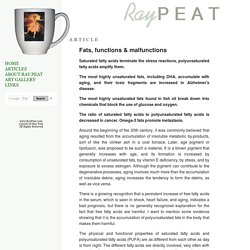
The most highly unsaturated fats, including DHA, accumulate with aging, and their toxic fragments are increased in Alzheimer's disease. The most highly unsaturated fats found in fish oil break down into chemicals that block the use of glucose and oxygen. The ratio of saturated fatty acids to polyunsaturated fatty acids is decreased in cancer.
Omega-3 fats promote metastasis. Around the beginning of the 20th century, it was commonly believed that aging resulted from the accumulation of insoluble metabolic by-products, sort of like the clinker ash in a coal furnace. There is a growing recognition that a persistent increase of free fatty acids in the serum, which is seen in shock, heart failure, and aging, indicates a bad prognosis, but there is no generally recognized explanation for the fact that free fatty acids are harmful. Eur J Pharmacol. 2003 Apr 11;466(1-2):199-205. . © Ray Peat Ph.D. 2013. Suitable Fats, Unsuitable Fats: Issues in Nutrition. Suitable Fats, Unsuitable Fats: Issues in Nutrition For fifty years, the mass media have been making the public think about the fats in their diet, filling the culture with clichés about bad saturated animal fats that raise cholesterol, or lately the trans-fats in margarine, and images of arteries clogged by bad fats.
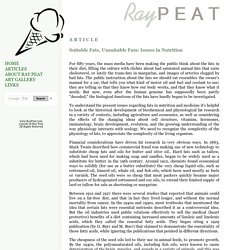
The public instruction about the fats we should eat resembles the owner's manual for a car, that tells you what kind of motor oil and fuel and coolant to use; they are telling us that they know how our body works, and that they know what it needs. But now, even after the human genome has supposedly been partly "decoded," the biological functions of the fats have hardly begun to be investigated. Financial considerations have driven fat research in very obvious ways. In 1883, Mark Twain described how commercial fraud was making use of new technology to substitute cheap fats and oils for butter and olive oil.. The immunosuppressive effects of PUFA are very general.
B. Fats and degeneration. 50 years ago, in the first phase of marketing the polyunsaturated fatty acids (PUFA), linoleic acid was “heart protective,” and the saturated fats raised cholesterol and caused heart disease.
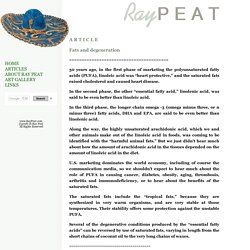
In the second phase, the other “essential fatty acid,” linolenic acid, was said to be even better than linoleic acid. Excess omega-3 fatty acid consumption by mothers during pregnancy and lactation caused shorter life span and abnormal ABRs in old adult offspring. - PubMed - NCBI. Untitled.